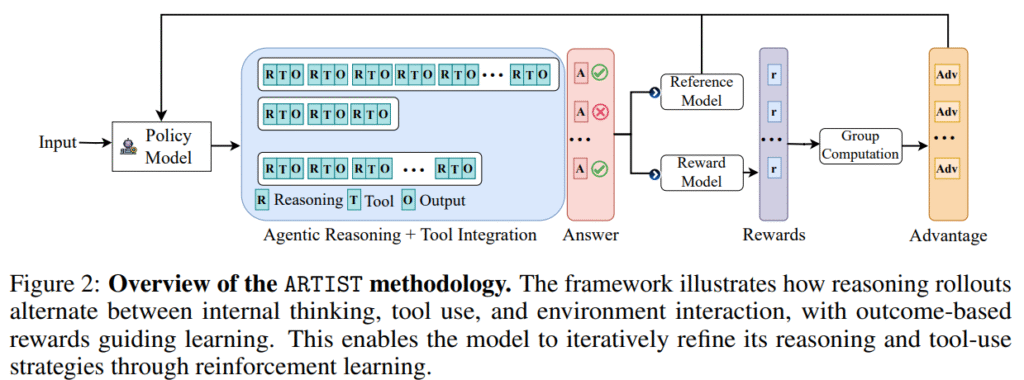LLMs have made impressive gains in complex reasoning, primarily through innovations in architecture, scale, and training approaches like RL. RL enhances LLMs by using reward signals to guide the model towards more effective reasoning strategies, resulting in longer and more coherent thought processes that adapt dynamically to a task’s complexity. Despite this, most RL-enhanced LLMs rely heavily on static internal knowledge and text-only reasoning, making them ill-suited for tasks requiring real-time information, domain-specific expertise, or precise computations. This limitation is especially evident in knowledge-intensive or open-ended problems where the inability to access and interact with external tools leads to inaccuracies or hallucinations.
To overcome these constraints, recent work has explored agentic reasoning, where LLMs dynamically engage with external tools and environments during the reasoning process. These tools include web search, APIs, and code execution platforms, while environments range from simulated browsers to operating systems. Agentic reasoning enables models to plan, adapt, and solve tasks interactively, beyond static inference. However, current methods for tool integration often depend on manually designed prompts or supervised fine-tuning, which hinder scalability and generalization. Emerging reinforcement learning techniques like Group Relative Policy Optimization (GRPO) provide more efficient and adaptive training for tool use without step-level supervision. Yet, the intersection of RL, tool use, and agentic decision-making remains underexplored, particularly in real-world tasks that demand multi-turn reasoning, dynamic planning, and robust external interaction.
Microsoft Research introduces ARTIST (Agentic Reasoning and Tool Integration in Self-improving Transformers), a framework that combines agentic reasoning, reinforcement learning, and dynamic tool use to enhance LLMs. ARTIST enables models to autonomously decide when, how, and which tools to use during multi-step reasoning, learning robust strategies without step-level supervision. The model improves reasoning and interaction with external environments through integrated tool queries and outputs. Evaluated on challenging math and function-calling benchmarks, ARTIST outperforms top models like GPT-4o, achieving up to 22% gains. It demonstrates emergent agentic behaviors, setting a new standard in generalizable and interpretable problem-solving.
ARTIST is a flexible framework that enables LLMs to interact with external tools and environments using reinforcement learning. It alternates between reasoning and tool use, allowing the model to choose when and how to invoke tools like code interpreters or APIs. Training uses GRPO, which avoids value functions and uses outcome-based group rewards. ARTIST structures rollouts into reasoning, tool queries, tool outputs, and final answers, with a composite reward system encouraging correctness, proper format, and successful tool use, enabling adaptive, multi-step problem-solving.
ARTIST outperforms various baselines, including GPT-4o and tool-augmented LLMs, on complex mathematical benchmarks like AMC, AIME, and Olympiad. It achieves higher Pass@1 accuracy, with notable gains of up to 22% over base models and over 35% compared to other tool-integrated methods. ARTIST’s advantage comes from its agentic reinforcement learning, enabling it to use external tools and refine multi-step solutions strategically. Compared to prompt-based tool usage, it shows superior tool invocation, response quality, and reasoning depth. While its benefits are most evident in complex tasks, ARTIST significantly improves simpler datasets like MATH-500 through selective tool use.
In conclusion, ARTIST is a framework that combines agentic reasoning, reinforcement learning, and dynamic tool use to enhance the capabilities of LLMs. Unlike traditional prompt-based approaches, ARTIST enables models to autonomously plan, adapt, and solve complex tasks by interacting with external tools and environments. It learns effective tool-use strategies without step-by-step supervision, improving accuracy and deeper reasoning. Evaluations on mathematical and function-calling benchmarks show significant performance gains. ARTIST also produces more interpretable reasoning paths and robust behaviors. This work highlights the potential of agentic RL as a promising direction for creating more adaptive and capable AI systems.
Check out the Paper. Also, don’t forget to follow us on Twitter.
Here’s a brief overview of what we’re building at Marktechpost:
- ML News Community – r/machinelearningnews (92k+ members)
- Newsletter– airesearchinsights.com/(30k+ subscribers)
- miniCON AI Events – minicon.marktechpost.com
- AI Reports & Magazines – magazine.marktechpost.com
- AI Dev & Research News – marktechpost.com (1M+ monthly readers)
- Partner with us
The post Microsoft Researchers Introduce ARTIST: A Reinforcement Learning Framework That Equips LLMs with Agentic Reasoning and Dynamic Tool Use appeared first on MarkTechPost.
Source: Read MoreÂ


